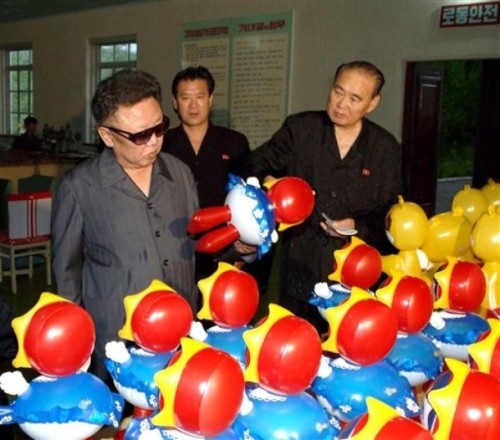Why do I (and so many other people) find picture after picture of Kim Jong-Il Looking At Things so interesting?
Without speaking for others, I'll admit I'm worried. Maybe the Dear Leader is onto something about human nature.
The interesting thing is not what Kim Jong-Il is saying with his face, but what the people in the background are making of it.
What do the faces in the backgrounds of all these pictures say to you? To me, they show emotions ranging from worry to pleasure to glee that the Dear Leader is Looking at Their Things.
The Dear Leader never shows in these pictures anything but Curiosity or Pleasure at the Things at which he Looks. The people who are Looking at him Looking At Things clearly care what impression their Things make on Him, but feel more or less uncertain about it.
I think this is what fear does to people. I've seen that same look among students who have certain church-political commitments they think their lives depend upon. They come in my office and want to close the door and talk about what they really believe, in contrast to what their Dear Leaders insist they pretend to believe.
Being a Dear Leader is bad leadership. Effective, obviously, but no less bad for that.
If there were nothing else speaking for it, the looks on those faces in the background are a definitive case for freedom.
Wednesday, January 5, 2011
How could we have helped this departing professor?
There is another side to this story we do not know. An English professor enumerates the reasons she is leaving the professoriate. Many of her reasons circle around the idea of a broken system.
We do not know who she is or anything about her institution or her experience. We do know that no one sided explanation is ever sufficient.
To what degree is it her, and to what degree is it really the culture of her institution or the larger system of higher education? I do not know.
I want to do whatever lies in my power to help the culture of higher education not do this to people. If they do it to themselves, it's on them. But here again, no one-sided explanations.
What can we do to correct the institutional side of whatever leads to this kind of disaffection and bitterness?
My bias is that finding the right person or group to blame will not help. The solution will have something to do with building trusting relationships in which genuine communication can happen.
(I do know I'm a pollyanna, by the way.)
(I do know I'm a pollyanna, by the way.)
Tuesday, January 4, 2011
No Limits
G.T. "Buck" Smith is the gold standard for relationship-based fundraising. For all practical purposes he's the inventor of modern major gifts fundraising, which is built around donors' relationships with the institution. Since 1977 he's brought that same skill to the president's office. This profile from the Chronicle of Higher Education is inspiring.
This is the best part:
"The underlying thing for me is relationships—hardly anything important happens that doesn't have to do with relationships," he says quietly one afternoon in his office. He is not talking just about cozying up to a wealthy donor or board chairman. He is talking about building connections to needy students, the lowliest employees, the local community. "It's getting to know people, being interested in them. … Life is built on genuine relationships, where trust and integrity are without question. When that is there, there are no limits."
Subscribe to:
Posts (Atom)



